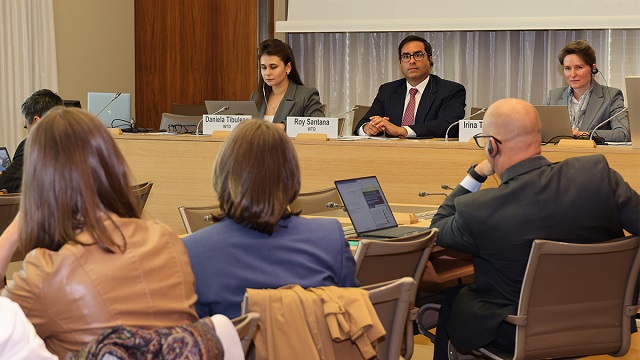Un seminario en línea examina el uso de las tecnologías digitales para mejorar los procedimientos de la cadena de suministro
The event brought together industry experts from the private sector to delve into the potential of digital technologies.

17 de mayo de 2024.- The event brought together industry experts from the private sector to delve into the potential of digital technologies to transform supply chain procedures. Roy Santana, Senior Counsellor at the WTO’s Market Access Division, moderated the session, emphasizing the role of digital technologies in improving collaboration between government and the private sector.
Amy Morgan, Vice President and Head of Trade Compliance at Altana Technologies, underscored the necessity of a collaborative approach to trade activity to foster trust and transparency among global supply chain stakeholders. She highlighted the role of technologies in revolutionizing supply chain operations, particularly in addressing contemporary challenges, such as geopolitical conflicts and climate change. She also said that using AI can help pursue more robust and modern public-private partnerships.
Lars Karlsson, Global Head of Trade and Customs Consulting at Møller-Maersk, delved into the complexities of the current global trade environment, emphasizing the importance of leveraging data and technology to enhance supply chain visibility and efficiency. He stressed the need for collaboration between the private sector, government and policymakers to create a more efficient and sustainable global trade system. Mr Karlsson highlighted the importance of supply chain management and visibility, particularly in light of new environmental, social and governance (ESG) regulations.
Louise Wiggett, Founder and Managing Director of Global Trade Solution (GTS), focused on challenges facing trade efficiency among African countries. She highlighted the potential of digital transformation initiatives to streamline processes and improve trade in the region. In particular, she cited a successful pilot project demonstrating significant reductions in clearance times and inspections through enhanced data accuracy and collaboration.
Sandra Fischer, SVP of Global Customs and Regulatory Affairs at DHL Express Global Head Office, emphasized the importance of balancing customer convenience with regulatory compliance. She outlined initiatives to ensure accurate data submission to customs authorities, including addressing undervaluation and intellectual property infringements. Ms Fischer discussed the use of technology, including machine learning, to identify non-compliant customers and improve screening processes. She also stressed the need for collaboration between industry and authorities to enhance automation, data quality and standardization.
The event underscored the importance of technology-driven solutions and collaboration between government and the private sector to address contemporary challenges and enhance global trade efficiency. The speakers highlighted the need for adherence to international standards and emphasized the potential of public-private partnerships to drive innovation and success in the digital era of global trade.
Closing the session, Mr Santana underscored the private sector’s increasing involvement in addressing supply chain issues. He also said that while digital technologies offer potential improvements, the discussions emphasized that streamlining processes and ensuring collaboration between government and the private sector are essential for success, with public-private partnerships seen as particularly beneficial.
















